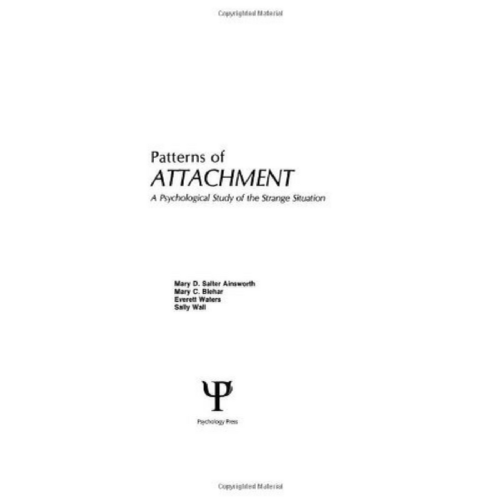-
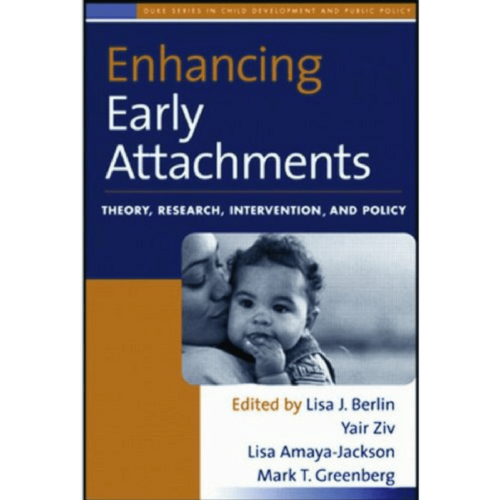 Edited by Lisa Berlin, Yair Ziv, Lisa Amaya-Jackson, Mark Greenberg Synthesizing the latest theory, research, and practices related to supporting early attachments, this volume provides a unique window into the major treatment and prevention approaches available today. Chapters address the theoretical and empirical bases of attachment interventions; explore the effects of attachment-related trauma and how they can be ameliorated; and describe a range of exemplary programs operating at the individual, family, and community levels. Throughout, the authors consider cross-cutting issues such as the core components of effective services and appropriate outcome measures for attachment interventions. Also discussed are policy implications, including how programs to enhance early child-caregiver relationships fit into broader health, social service, and early education systems. Buy on Amazon
Edited by Lisa Berlin, Yair Ziv, Lisa Amaya-Jackson, Mark Greenberg Synthesizing the latest theory, research, and practices related to supporting early attachments, this volume provides a unique window into the major treatment and prevention approaches available today. Chapters address the theoretical and empirical bases of attachment interventions; explore the effects of attachment-related trauma and how they can be ameliorated; and describe a range of exemplary programs operating at the individual, family, and community levels. Throughout, the authors consider cross-cutting issues such as the core components of effective services and appropriate outcome measures for attachment interventions. Also discussed are policy implications, including how programs to enhance early child-caregiver relationships fit into broader health, social service, and early education systems. Buy on Amazon -
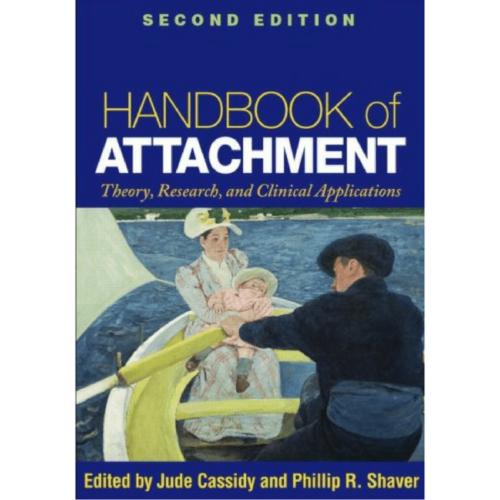 Jude Cassidy, Ph.D.; Phillip R. Shaver, Ph.D. From foremost authorities, this comprehensive work is more than just the standard reference on attachment-it has “become indispensable” in the field. Coverage includes the origins and development of attachment theory; biological and evolutionary perspectives; and the role of attachment processes in personality, relationships, and mental health across the lifespan. Buy on Amazon
Jude Cassidy, Ph.D.; Phillip R. Shaver, Ph.D. From foremost authorities, this comprehensive work is more than just the standard reference on attachment-it has “become indispensable” in the field. Coverage includes the origins and development of attachment theory; biological and evolutionary perspectives; and the role of attachment processes in personality, relationships, and mental health across the lifespan. Buy on Amazon -
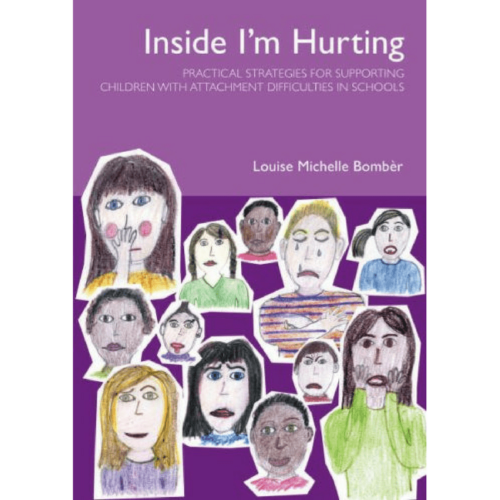
Practical Strategies for Supporting Children with Attachment Difficulties in Schools
Louise Michelle Bombier Inside I'm Hurting provides educational professionals with a much-needed classroom handbook of new strategies, practical tools and the confidence for supporting these children from an attachment perspective, thus promoting inclusion in the school system... Buy on Amazon -
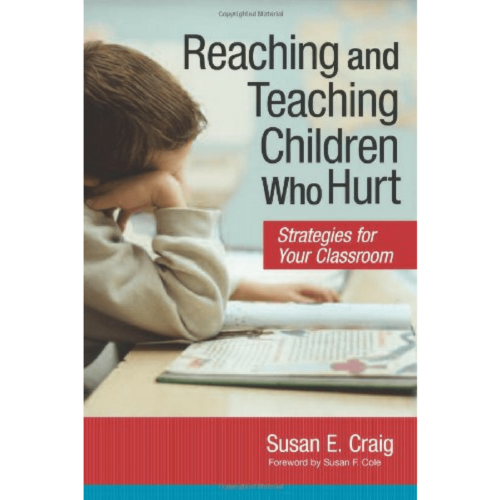 Susan E. Craig Each year hundreds of thousands of children in the United States experience trauma—such as abuse, neglect, or community violence—that creates tough obstacles to academic achievement and social success. Now there's a practical, strategy-filled book that shows educators how to reach and teach students exposed to trauma... Buy on Amazon
Susan E. Craig Each year hundreds of thousands of children in the United States experience trauma—such as abuse, neglect, or community violence—that creates tough obstacles to academic achievement and social success. Now there's a practical, strategy-filled book that shows educators how to reach and teach students exposed to trauma... Buy on Amazon -
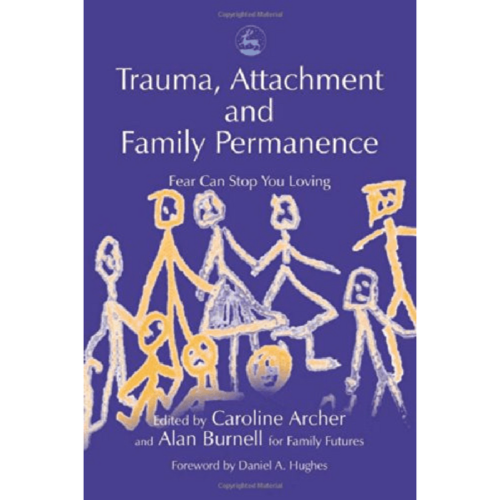 Caroline Archer Fostered and adopted children can present major challenges resulting from unresolved attachment issues and early traumatic experiences. In this much-needed book, the contributors provide a variety of complementary perspectives on the needs of these children and their families, focusing on ways of integrating attachment theory and developmental psychology into effective practice. Examining multiple aspects of work with children who are unable to live with their birth families, the book includes contributions on the assessment, preparation and support needs of children and families, attachment and the neurobiological effects of trauma, effective management of contact with birth families and developmental challenges in school settings. The use of creative arts therapies, alongside developmental reparenting strategies as part of a long-term attachment therapy 'package' are explored in some detail... Buy on Amazon
Caroline Archer Fostered and adopted children can present major challenges resulting from unresolved attachment issues and early traumatic experiences. In this much-needed book, the contributors provide a variety of complementary perspectives on the needs of these children and their families, focusing on ways of integrating attachment theory and developmental psychology into effective practice. Examining multiple aspects of work with children who are unable to live with their birth families, the book includes contributions on the assessment, preparation and support needs of children and families, attachment and the neurobiological effects of trauma, effective management of contact with birth families and developmental challenges in school settings. The use of creative arts therapies, alongside developmental reparenting strategies as part of a long-term attachment therapy 'package' are explored in some detail... Buy on Amazon -
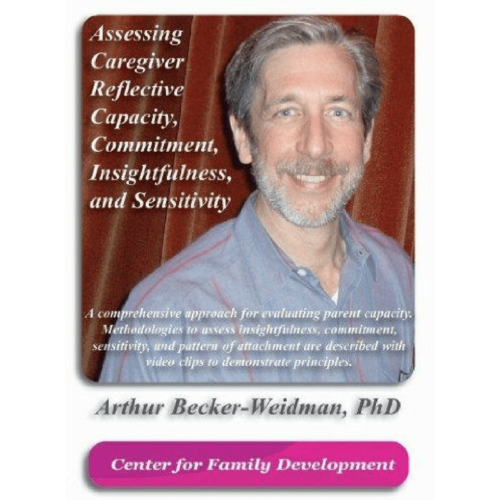 Arthur Becker-Weidman, PhD This two-DVD set (approximately three hours) explains how to assess children for Complex Trauma and disorders of attachment. The set contains:
Arthur Becker-Weidman, PhD This two-DVD set (approximately three hours) explains how to assess children for Complex Trauma and disorders of attachment. The set contains:- Introduction and overview of Complex Trauma and Disorders of Attachment
- Complex Post Traumatic Stress Disorder defined
- Effects of trauma on development
- Domains of impairment caused by trauma
- Differential diagnosis
- Video tape of children being assessed
- Useful tests and measures such as the Attachment Story Completion Test and others
- Complete PowerPoint Presentation slides.
-
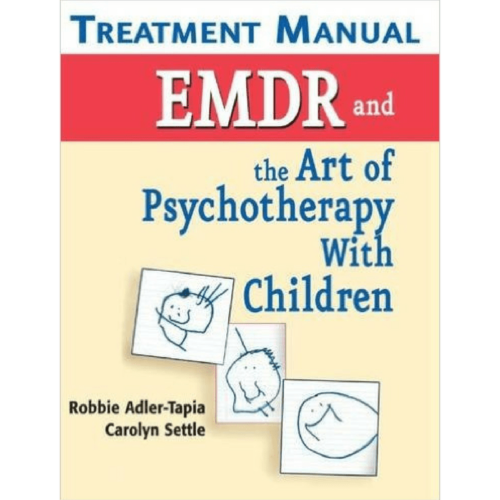 Robbie Adler-Tapia & Carolyn Settle This treatment manual provides a simple and practical way to use the EMDR scripts, protocols, and forms in psychotherapy with children and adolescents that are detailed in the book EMDR and the Art of Psychotherapy with Children. The manual was derived from the EMDR Fidelity Research Manual for children, which was created by these authors. By using a standard treatment protocol for providing EMDR psychotherapy for children and by conducting pre- and post-treatment assessments, therapists can also conduct their own study of treatment outcomes. In additional to contributing to research, the manual is beneficial to the therapist and the client in order to monitor treatment progress and outcomes. Buy on Amazon
Robbie Adler-Tapia & Carolyn Settle This treatment manual provides a simple and practical way to use the EMDR scripts, protocols, and forms in psychotherapy with children and adolescents that are detailed in the book EMDR and the Art of Psychotherapy with Children. The manual was derived from the EMDR Fidelity Research Manual for children, which was created by these authors. By using a standard treatment protocol for providing EMDR psychotherapy for children and by conducting pre- and post-treatment assessments, therapists can also conduct their own study of treatment outcomes. In additional to contributing to research, the manual is beneficial to the therapist and the client in order to monitor treatment progress and outcomes. Buy on Amazon -
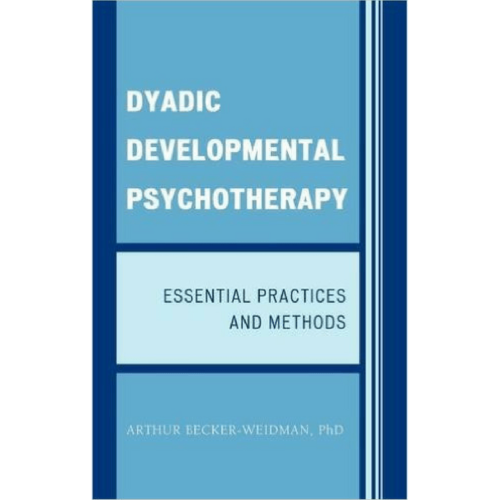 Art Becker-Weidman Grounded in attachment theory and trauma, Dyadic Developmental Psychotherapy (DDP) is an evidence-based, effective, and empirically validated treatment for complex trauma and disorders of attachment. This manual for the practice of DDP will give therapists, educators, and child welfare and residential treatment professionals the tools necessary to help children who have a history of neglect, abuse, orphanage care, or other experiences that may interfere with the normal development of attachment between parent and child. Becker-Weidman looks at the importance of a comprehensive and thorough assessment as the basis for treatment planning and explains in detail the main elements of DDP, including intersubjectivity, emotionally based dialogues, narratives, and co-regulation of emotions and meaning, as well as illustrating these elements through detailed case examples and dialogue. Dr. Becker-Weidman then looks at how the various principles, methods, and techniques of DDP are differentially used in each stage of treatment. A section on parenting outlines how therapists can train caregivers in attachment-facilitating parenting approaches. This book will serve as a treatment manual for DDP and will provide directly useful material for practicing therapists. In addition, the text will be useful in graduate courses on treatment, child welfare, family therapy, and child psychology. Buy on Amazon
Art Becker-Weidman Grounded in attachment theory and trauma, Dyadic Developmental Psychotherapy (DDP) is an evidence-based, effective, and empirically validated treatment for complex trauma and disorders of attachment. This manual for the practice of DDP will give therapists, educators, and child welfare and residential treatment professionals the tools necessary to help children who have a history of neglect, abuse, orphanage care, or other experiences that may interfere with the normal development of attachment between parent and child. Becker-Weidman looks at the importance of a comprehensive and thorough assessment as the basis for treatment planning and explains in detail the main elements of DDP, including intersubjectivity, emotionally based dialogues, narratives, and co-regulation of emotions and meaning, as well as illustrating these elements through detailed case examples and dialogue. Dr. Becker-Weidman then looks at how the various principles, methods, and techniques of DDP are differentially used in each stage of treatment. A section on parenting outlines how therapists can train caregivers in attachment-facilitating parenting approaches. This book will serve as a treatment manual for DDP and will provide directly useful material for practicing therapists. In addition, the text will be useful in graduate courses on treatment, child welfare, family therapy, and child psychology. Buy on Amazon -
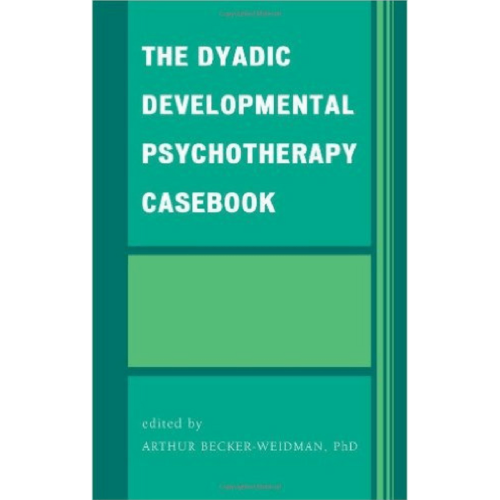 Art Becker-Weidman This collection of transcripts from sessions by certified Dyadic Developmental Psychotherapists gives therapists, educators, and child welfare and residential treatment professionals a detailed understanding of how Dyadic Developmental Psychotherapy is used to help children who have a history of neglect, abuse, orphanage care, or other experiences that may interfere with the normal development of attachment between parent and child. The book begins with a description of DDP, its essential components, and the ways in which those components are used differentially in different phases of treatment. The transcripts that follow illustrate those components and their uses. They cover a diverse range of clients and families so that the reader can appreciate the depth and breadth of DDP. Both the editor and the therapists themselves provide analysis and commentary on the therapists' goals, impressions, and techniques. This book complements the treatment manual Dyadic Developmental Psychotherapy: Essential Methods and Practices, and will be useful in graduate courses on treatment, child welfare, family therapy, and child psychology. Buy on Amazon
Art Becker-Weidman This collection of transcripts from sessions by certified Dyadic Developmental Psychotherapists gives therapists, educators, and child welfare and residential treatment professionals a detailed understanding of how Dyadic Developmental Psychotherapy is used to help children who have a history of neglect, abuse, orphanage care, or other experiences that may interfere with the normal development of attachment between parent and child. The book begins with a description of DDP, its essential components, and the ways in which those components are used differentially in different phases of treatment. The transcripts that follow illustrate those components and their uses. They cover a diverse range of clients and families so that the reader can appreciate the depth and breadth of DDP. Both the editor and the therapists themselves provide analysis and commentary on the therapists' goals, impressions, and techniques. This book complements the treatment manual Dyadic Developmental Psychotherapy: Essential Methods and Practices, and will be useful in graduate courses on treatment, child welfare, family therapy, and child psychology. Buy on Amazon -
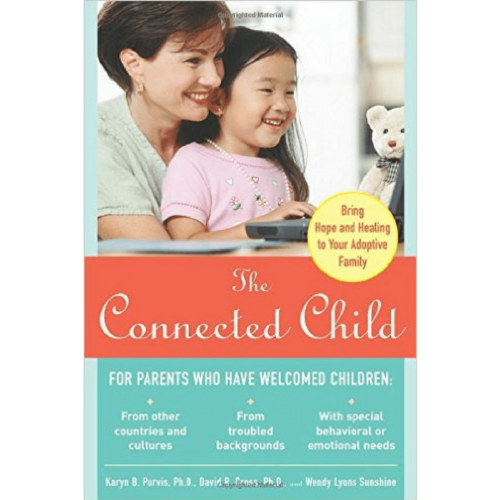 Karyn B. Purvis, David R. Cross & Wendy Lyons Sunshine The adoption of a child is always a joyous moment in the life of a family. Some adoptions, though, present unique challenges. Welcoming these children into your family--and addressing their special needs--requires care, consideration, and compassion. Written by two research psychologists specializing in adoption and attachment, The Connected Child will help you:
Karyn B. Purvis, David R. Cross & Wendy Lyons Sunshine The adoption of a child is always a joyous moment in the life of a family. Some adoptions, though, present unique challenges. Welcoming these children into your family--and addressing their special needs--requires care, consideration, and compassion. Written by two research psychologists specializing in adoption and attachment, The Connected Child will help you:- Build bonds of affection and trust with your adopted child
- Effectively deal with any learning or behavioral disorders
- Discipline your child with love without making him or her feel threatened
-
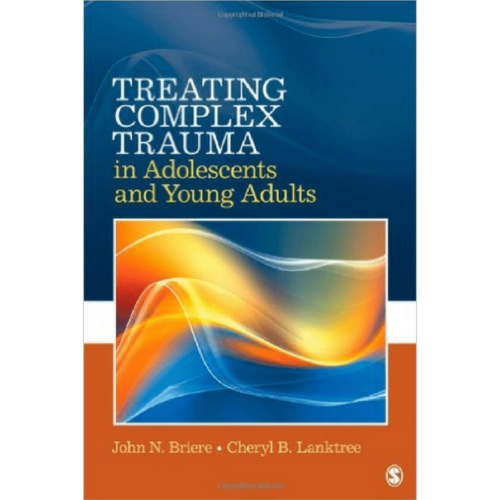 John N. Briere & Cheryl B. Lanktree Treating Complex Trauma in Adolescents and Young Adults is the first empirically-validated, multi-component manual to guide practitioners and students in the treatment of multi-traumatized adolescents and young adults. Best-selling author, John Briere, and renowned clinician, Cheryl Lanktree, outline a hands-on, culturally-sensitive approach to the most challenging of young clients: those suffering from complex trauma histories, multiple symptoms, and, in many cases, involvement in a range of problematic behaviors. This model, Integrated Treatment of Complex Trauma for Adolescents (ITCT-A), integrates a series of approaches and techniques, which are adapted according to the youth's specific symptoms, culture, and age. Components include relationship-building, psychoeducation, affect regulation training, trigger identification, cognitive processing, titrated emotional processing, mindfulness training, collateral treatments with parents and families, group therapy, and system-level advocacy. Buy on Amazon
John N. Briere & Cheryl B. Lanktree Treating Complex Trauma in Adolescents and Young Adults is the first empirically-validated, multi-component manual to guide practitioners and students in the treatment of multi-traumatized adolescents and young adults. Best-selling author, John Briere, and renowned clinician, Cheryl Lanktree, outline a hands-on, culturally-sensitive approach to the most challenging of young clients: those suffering from complex trauma histories, multiple symptoms, and, in many cases, involvement in a range of problematic behaviors. This model, Integrated Treatment of Complex Trauma for Adolescents (ITCT-A), integrates a series of approaches and techniques, which are adapted according to the youth's specific symptoms, culture, and age. Components include relationship-building, psychoeducation, affect regulation training, trigger identification, cognitive processing, titrated emotional processing, mindfulness training, collateral treatments with parents and families, group therapy, and system-level advocacy. Buy on Amazon

